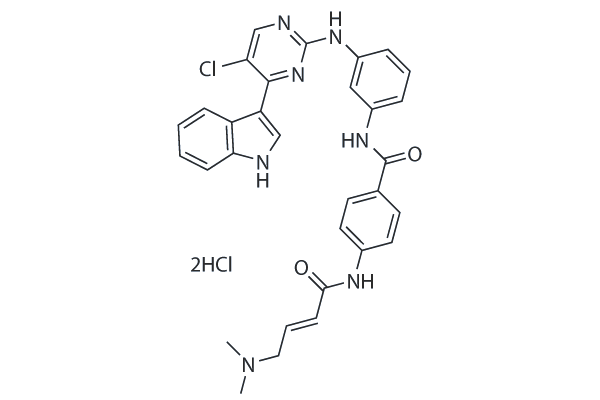THZ1 2HCl |
| Catalog No.GC25996 |
THZ1 is a covalent CDK7 inhibitor which has the unprecedented ability to target a remote cysteine residue located outside of the canonical kinase domain, providing an unanticipated means of achieving selectivity for CDK7.
Products are for research use only. Not for human use. We do not sell to patients.

Cas No.: 2095433-94-4
Sample solution is provided at 25 µL, 10mM.
THZ1 is a covalent CDK7 inhibitor which has the unprecedented ability to target a remote cysteine residue located outside of the canonical kinase domain, providing an unanticipated means of achieving selectivity for CDK7.
THZ1 uses a unique mechanism, combining ATP-site and allosteric covalent binding, as a means of attaining potency and selectivity for CDK7. THZ1 irreversibly inhibits RNAPII CTD phosphorylation by covalently targeting a unique cysteine located outside the kinase domain of CDK7. THZ1, but not THZ1-R, completely inhibits the phosphorylation of the established intracellular CDK7 substrate RNAPII CTD at Ser 5 and Ser 7, with concurrent loss of Ser 2 phosphorylation at 250 nM in Jurkat cells. THZ1 exhibits strong antiproliferative effects across a broad range of cancer cell lines from various cancer types. In Jurkat cells, low-dose THZ1 has a profound effect on a small subset of genes, including the key regulator RUNX1, thus contributing to subsequent loss of the greater gene expression program and cell death[1]. THZ1 causes defects in Pol II(polymerase II) phosphorylation, co-transcriptional capping, promoter proximal pausing, and productive elongation[2].
THZ1 reduces the proliferation of KOPTK1 T-ALL cells in a human xenograft mouse model. THZ1 is well tolerated at 10 mg/kg with no observable body weight loss or behavioural changes, suggesting that it causes no overt toxicity in the animals[1].
[1] Kwiatkowski N, et al. Nature. 2014, 511(7511):616-20. [2] Nilson KA, et al. Mol Cell. 2015, 59(4):576-87.
Average Rating: 5 (Based on Reviews and 30 reference(s) in Google Scholar.)
GLPBIO products are for RESEARCH USE ONLY. Please make sure your review or question is research based.
Required fields are marked with *




















